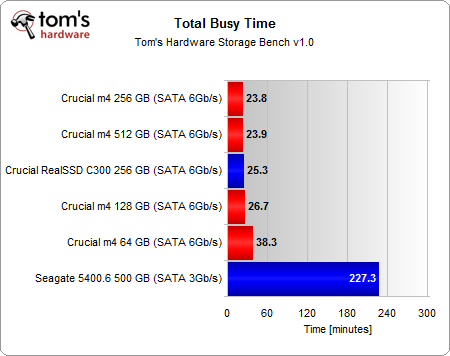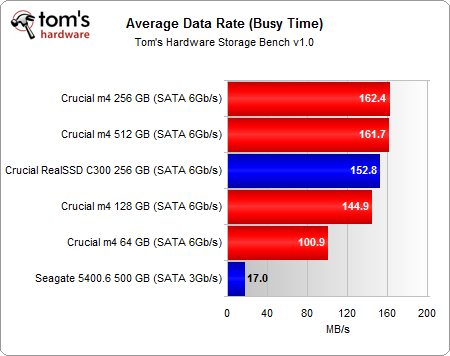Crucial's m4 SSD Tested At 64, 128, 256, And 512 GB
Tom’s Hardware Storage Bench v1.0: Real-World Analysis
If you're unfamiliar with Storage Bench v1.0, you can read more about it in Second-Gen SandForce: Seven 120 GB SSDs Rounded Up. But, in a few words, it's a trace of my own personal workstation that lets us rank the performance of drives given a particular I/O workload.

With the exception of the 256 GB model, Crucial's m4 drives line up the way we'd expect, given their capacity points. The 512 GB takes second place, and is, in turn, faster than the 128 GB model, which itself outperforms the 64 GB version. Interestingly, the 256 GB m4 turns out to be the fastest drive; that's odd because we would have expected the 256 GB m4 to be slightly faster than the 256 GB C300, but slower than the 512 GB m4.
All of the m4 drives in our lab employ the firmware version 0001. However, the 256 GB model comes from an earlier production run. It's actually the same drive we tested in Crucial m4 And Intel SSD 320: The Other SSD Competitors. The company went ahead and sent us the other capacities at a later date. That's the only possible explanation for this discrepancy (in fact, the pictures on page two indicate that the 256 GB drive's Marvel controller has a slightly different label).

There's very little difference between the average data rate for the 128 GB, 256 GB, and 512 GB drives. The 64 GB m4 is another story. It has an average data rate of 100.9 MB/s, which explains why its busy time is 40% greater than the 128 GB m4.
Despite the 64 GB version's loss to the larger models, though, compare it to the 500 GB Momentus 5400.6. The difference between SSDs and hard drives is stark. Seagate's 5400.6 achieves an average data rate of only 17.0 MB/s. That's one-fifth the speed of the 64 GB m4 and one-ninth of the larger-capacity m4s. The performance difference is tangible enough to feel during day-to-day usage.
Get Tom's Hardware's best news and in-depth reviews, straight to your inbox.
Current page: Tom’s Hardware Storage Bench v1.0: Real-World Analysis
Prev Page Test Setup And Benchmarks Next Page 4 KB Random Performance: Throughput-
wintermint I've been recommending the Crucial m4 128gb to people, and after seeing this.. I'm glad I did :]Reply -
sceen311 it'd be nice if they threw a 7200 rpm hardrive on the bench... We don't all have laptops ya know.Reply -
compton I'm glad this was done. It's rare that you get the chance to stack all the capacity points up (as in never). I bought an Intel 510 120GB and a M4 64GB and my own testing showed that you'd never know the difference besides the capacity (in day to day use, besides lower max write MB/S). I kinda like keeping my system drive to a bare minimum -- just Win7 no swap or hibernate, Office, a few other apps, and then I keep my Steam folder on a separate drive. Simple. I will say that if you are building a new system, cut whatever you have to in order to fit at least a 64GB SSD -- the M4 is excellent at any capacity. I'd rather have to go down to an i3 from a 2500k than from a SSD to a HDD. I get tired of people saying "it's not worth it" and "they're not much faster than a 7200rpm". Those people must be doing it wrong.Reply -
beenthere Now if they could only make these SSDs reliable, we could all enjoy some performance improvement. Intel, Micron, OCZ and Corsair to name a few have all had reliability/compatibility/firmware issues of some sort resulting in loss of data, which for me is simply unacceptable.Reply -
Last month I got a 64GB for my laptop and a 128GB m4 for my desktop. So far no issues, and the speed is great. Glad I got the 128GB and not the 256GB.Reply
-
PCMark 7 Storage tests are just pathetic, they have messed some of them up on purpose it seems just to shrink the difference between systems containing SSD and the ones containing HDD only, useless bench from start to "finish"...Reply
-
mroanhaus I picked up the 64 GB M4 two weeks ago on Newegg for under $90. I am so glad I bought it, the thing makes boot times lightning fast. I have Win7 64-bit, Photoshop, 3DS Max, Google Chrome, and a few little monitoring and Bitcoin mining apps on there and I STILL have 21 GB to spare. Don't buy the 128 GB unless you really need it, throwing Steam and other massive apps will be much better suited on a secondary HDD. SSDs are simply amazing and well worth the money spent, even if you're a cheapass like me they're still affordable. The time saved from having to wait around while booting your computer makes SSDs worth the money imoReply -
burnley14 ReplySee how they all hover pretty close to the same price per gigabyte, while sequential write and random write performance trend upward? Those are the spoils available to folks willing to spend more on higher capacities.
This is true, but in 6 months when the whole lineup is outdated and the next generation of drives blows these ones away, those that spent more are going to have spent the extra money without much purpose. -
cknobman burnley14This is true, but in 6 months when the whole lineup is outdated and the next generation of drives blows these ones away, those that spent more are going to have spent the extra money without much purpose.Reply
Well going by your logic why should anyone ever spend money on anything in technology??? Guess its always a waste huh?
Failed logic.